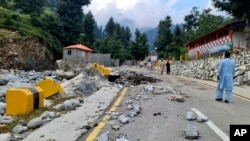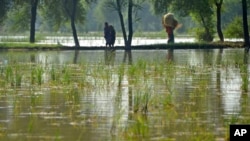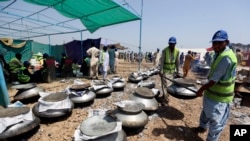An internationally supported study has found that recent catastrophic floods in Pakistan have inflicted more than $30 billion in damages and economic losses. It notes that the early estimates may increase as the situation continuously evolves on the ground.
The Pakistani government conducted the post-disaster needs assessment in partnership with the United Nations, the Asian Development Bank, the World Bank and the European Union, and it announced the findings Friday.
"Given Pakistan's limited fiscal resources, significant international support and private investment will be essential for a comprehensive and resilient recovery," the assessment said.
Housing, agriculture, livestock, transport and communications sectors suffered the most significant damage in the impoverished South Asian nation of about 220 million people. The agricultural damage and losses will affect the external trade and services sectors, the study warned.
Seasonal monsoon rains, made worse by global climate change, have triggered the unprecedented deluge across Pakistan, affecting 33 million people and killing more than 1,730 since mid-June.
Floodwaters drenched one-third of the country at one point, damaging or washing away more than 2 million houses, killing 1.2 million livestock animals, damaging 13,000 kilometers of roads and displacing 8 million people, including 644,000 living in relief camps. The U.N. says although the water has receded, 7% of the territory is still inundated.
"The situation is still evolving, with flood waters stagnant in many areas, causing water-borne and vector-borne diseases to spread, and more than 8 million displaced people are now facing a health crisis," the study said.
According to the report, Sindh province was most affected by the flooding, with close to 70% of total damage and losses, followed by Balochistan, Khyber Pakhtunkhwa and Punjab provinces.
Loss of household income and assets, rising food prices, and disease outbreaks are particularly affecting the poorest and most vulnerable districts.
"The national poverty rate may increase by 3.7 to 4 percentage points, potentially pushing between 8.4 [million] and 9.1 million more people below the poverty line," the study noted.
Rehabilitation and reconstruction estimates are at least $16.3 billion, not including the reconstruction needs of private entities or any investment to help Pakistan adapt to climate change and become more resilient to future climate shocks.
After reviewing the scale of the disaster, the U.N. earlier this month increased its international humanitarian aid appeal for Pakistan from $160 million to $816 million, fearing that a surge in waterborne diseases and food insecurity could pose new challenges for the impoverished country.
The world body says that as of this week, countries have committed $110 million, or 23%, of the appeal.
The U.N. has cautioned that funding for food assistance may run out by the end of the year if more funds are not received, noting that nearly 15 million people will require emergency food assistance from December through March.
On Thursday, the United States pledged an additional $30 million in humanitarian aid to support flood victims, bringing the total disaster-related assistance from Washington to Islamabad this year to $97 million.






